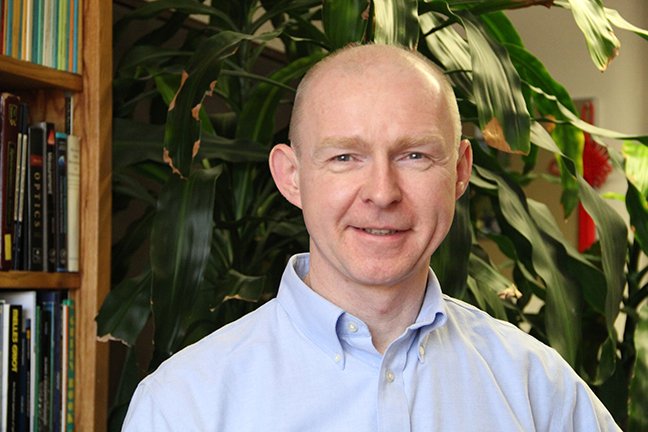Phil Buhlmann selected as a CSE Distinguished Professor

MINNEAPOLIS / ST. PAUL (05/12/2022)—Professor Phil Buhlmann has been named a recipient of the College of Science and Engineering (CSE) Distinguished Professorship, an award designed to honor exceptional faculty for their efforts in and contributions to teaching and scholarly research and for their genuine commitment to CSE and its activities. CSE Distinguished Professors receive a one-time award of $15,000 to be used for professional development or research.
“Prof. Buhlmann is an outstanding chemist and a world leader in his field. He runs a research program with great national and international impact, quality, and productivity, with a highly cited publication record and strong connections to industry,” said David Blank, head of the chemistry department, who nominated Buhlmann for this award. “His teaching is excellent and his service contributions are superb.”
As a researcher, Buhlmann is an expert in electrochemistry, with special interests in fluorous materials and host guest chemistry. He has taken a unique approach to developing chemical sensors. While he primarily considers himself an electroanalytical chemist, he strongly considers innovative synthetic chemistry and materials sciences as tools to push the limits of chemical sensors. Important examples of his trend setting work include his early work with hydrogen-bonding receptors for the development of anion sensors that continues to be well cited after many years, as well as his more recent development of potentiometric and voltammetric sensors based on unique fluorous materials to achieve unprecedented selectivities and reduce biofouling. His introduction of nanoporous carbon materials as solid contact materials for use in potentiometric sensors to improve long-term response stabilities has caused a paradigm shift in his field.
Buhlmann has published 159 peer-reviewed articles in journals of high reputation. The recognition of his work is illustrated by over 147 invited talks and over 20,000 citations. This includes two publications in Chemical Reviews that have been cited over 4,800 times as well as a textbook that has been published in six languages and has been cited over 3,600 times.
Buhlmann has combined his high research productivity with exceptional service to the department, the college, and the University at large. As Director of Graduate Studies (DGS) from 2012-2020, he led many initiatives, including the elimination of specialty areas, the improvement of the annual progress report, implementation of the annual training of teaching assistants in the topics of stress and mental health, introduction of a 4th-year milestone, introduction of the Plan C Master's degree, DGS office hours, and an increased use of fellowships for recruiting a more diverse student body.
Buhlmann is passionate about addressing issues of stress and mental health for graduate students. He works closely with the University of Minnesota's Boynton Health on those issues, including making students, faculty, and staff aware of resources, teaching them to recognize signs of stress and despair, and equipping them with knowledge and resources to help. His initiative led to the founding of the Community of Chemistry Graduate students, a student-led organization that organizes events to improve the lifestyles of graduate students and help in their career development. He is also one of the Department of Chemistry's mental health advocates, and leads workshops on mental health awareness.
Buhlmann earned his master’s and doctorate degrees in chemistry from the Swiss Federal Institute of Technology in Zurich. Before joining the Department of Chemistry in September 2000, he was a post-doctoral fellow and then staff member at the University of Tokyo. In 2009, he was a visiting professor at the Tokyo Institute of Technology. Buhlmann joined the Department of Chemistry in 2000 and served as Director of Graduate Studies from 2012 to 2020. He was named Distinguished University Teaching Professor in 2015 and 3M/Alumni Professor in 2017. In 2019, he was named an American Chemical Society Fellow.